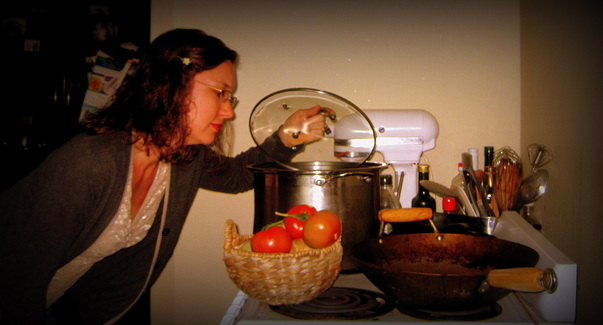 cook smarter, stress less ...you gotta eat, so why not upgrade your kitchen time? do you... ...struggle with trying to cook homemade food without spending all your time in the kitchen? ...stare into your fridge for long minutes, with only mustard and bare shelves staring back at you? ...want to eat healthier lunches at work, but never cook ahead of time, so you end up eating out more often than you'd like to admit? (warning sign #1: the fast food clerk knows your name and order) if so, then join Dr. Angela on this free 3 day workshop and find out how to... ...structure your kitchen time for minimal prep and maximal meal production ...eat better, cook smarter and stress less over your food choices ...learn how to keep your fridge stocked with healthy meals and snacks ...and get a few bonus recipes to help you get started, now! join me from the comfort of your pjs Register for the workshop now (it takes 2 seconds), then sit back and follow along as the entire course is sent to your inbox through my short course on upping your kitchen game. Each day will bring a new e-booklet to your inbox, so you can read and follow along at any time. so what's the cost? For all this love, time, and organization, I'm bring you Let's Get Cooking for free ...but only if you sign up now through June 9th alright, so when do we start? Let's Get Cooking runs Monday June 10th to Wednesday June 12th. Sign up today to save your spot. If you have a friend who also needs some kitchen intervention, pass this link along and Get Cooking together!
1 Comment
There are over 300,000 people in the US who suffer a stroke each year, especially those with a personal and/or family history of heart disease, diabetes and clotting disorders. The aftermath is uncertain and often ranges from paralysis to difficulty speaking and other far-reaching effects. Since the damage is already done by the time someone knows they have a stroke, prevention is key for this potentially devastating disease. Research published last week in the British Medical Journal found that those who ate fish 2-4 times a week had a 6% less chance of a stroke, and those who ate fish 5 times a week had a 12% less chance of having a stroke. Fish has been long recognized as an "anti-inflammatory" food, meaning that it reduces, rather than stimulates an aggravation of your immune system when you eat it. Just remember, that there is a wide diversity of fish out there, and be cautious in your choices.
Wild-caught Alaskan salmon, for example, has higher amounts of Omega 3 fatty acids and bioflavonoids than farmed Atlantic salmon- which is "pinked up" by artificial dye to look as healthy and fresh as its wild counterpart. And when considering species of fish and fishing practices, over fishing and other environmental concerns (not to mention heavy metal content such as Mercury), it can at first be difficult to find a healthy source of fish that you feel good purchasing. Take a look at Environmental Working Group's Safe Fish List and this Sustainable Seafood Shopping Guide for pointers, recommendations and further reading. Here's to your good health. What was your favorite school lunch item? I'll admit mine was the chocolate milk; less than healthy choices such as mine may soon be a thing of the past. School lunches are in the cross-hairs of the current legislative activity aimed at improving children's nutrition. Last year, Obama signed the Healthy, Hunger-free Kids Act, showing how concerning our children's lunchtime food choices are (even the presidents getting involved here!). Today's Washington Post featured an article titled, "School lunch debates heat up," where author Jennifer LaRue Huget asks: "...whose responsibility it is to decide what to feed America’s schoolchildren, who should determine what’s healthful and what’s not, and what role [do] parents play in that decision-making process. We also have to consider whether serving nutritionally sound meals at school is itself part of the curriculum; teaching kids what foods are best for their bodies by offering such foods at lunchtime." So whose responsibility is it that kids eat healthy lunches?
Shouldn't it be everyone's? If healthy meal choices are made at home, then children will (by extension) bring healthy lunches to school. And for those who are provided meals at school (for parental convenience and/or reduced-price), then shouldn't this be where the schools step in with healthy choices? If childhood (and adult) epidemic levels of obesity and diabetes are to be reversed, we need to take what kids eat seriously. When nutrition becomes a value that we as a society act upon, only then will children benefit and chronic disease stats decline. Until that time, Lunchables will continue to be the top lunchtime trading commodity, and our following generations will grow evermore unhealthy and overweight. I love to hear all of your comments, questions, and suggestions for upcoming articles. Feel free to contact me any time! Thanks for reading! -Angela |
Archives
June 2024
Categories
All
|
about the doc |
patient infocontact |
|
Privacy Policy
© Copyright 2011-2024, Dr. Angela Cortal ND LLC website content is for educational purposes only and is no substitute for medical advice (see the Terms of Use Agreement for this site), you must establish a doctor-patient relationship to receive that! |

